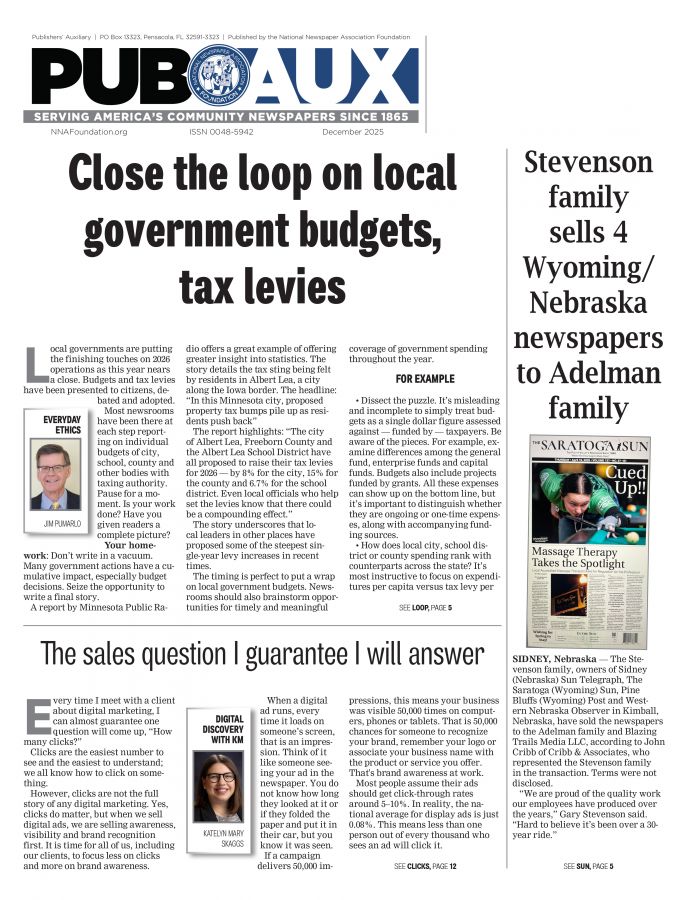The pandemic has made Americans more interested in health issues
Al Cross
Mar 1, 2021


The coronavirus pandemic could actually make America healthier in the long run by prompting reinvestment in its eroded public-health system, Joanne Kenen, executive health-care editor of Politico, wrote recently.
I think it could also help local newspapers boost their audiences by building on what they have done: making themselves indispensable, as Mark Glaser more recently wrote for Trust, Media and Democracy, a partnership of Gallup Inc. and the Knight Foundation.
“In the face of severe business challenges during the pandemic, many outlets have shown incredible strength,” Glaser wrote. His take reflected what I found when I did a project for the Kentucky Press Association about the pandemic performance of newspapers in the state.
“In perhaps the most challenging year for newspapers in their history, the community papers of Kentucky came through for Kentuckians,” I wrote. “They published special editions devoted to the pandemic. They told the stories of people affected and anguished by it. They published tributes to front-line local heroes. They served as trusted sources of information about a subject that became scientifically confusing and politically contentious. They helped readers separate fact from fiction, and they held public officials accountable.”
This is the sort of report that could be done in any state. You can read it at https://tinyurl.com/1k2fv9fs.
So, where do we go from here?
First, keep it up. The pandemic is still raging, and more contagious strains could cause spikes in cases even after most Americans are vaccinated, so they need reminding of the need to wear masks, keep their distance and get a vaccine when they can.
Looking ahead, the pandemic has clearly made Americans more interested in health issues and more aware of the public-health system, the roots of which are the local health departments in almost every county. This is a good year to take a look at your health department and ask: How is it funded and governed? How well has it performed? Does it need more money? What for? What differences could it make in the lives of local people?
The pandemic has also been rough on rural hospitals, 135 of which have closed in the last decade, and another 453 are vulnerable to closure, according to a report we noted on The Rural Blog. You can find it at https://tinyurl.com/4amtp3up.
How is your rural hospital doing? If it’s publicly owned, you probably have a good idea, but many are privately owned and secretive about their finances. But if they take Medicare, they have to report their basic finances to the federal government, and those reports are available in a new database that we noted on The Rural Blog at https://tinyurl.com/u369ca6z.
Another health impact of the pandemic is often not thought of as a health topic, but it is: drug abuse and overdoses. The number of overdose deaths last year hasn’t been finally compiled because it requires case-by-case review, but it is expected to set a record.
Many local newspapers largely ignore the subject, treating it only as a criminal-justice topic, but it’s a problem that can affect anyone, and it’s one that needs community solutions.
“This is one of those problems that cannot be solved by anyone but us. I can assure you that Superman is not coming,” Editor Brad Martin of the Hickman County Times in Centerville, Tennessee, wrote in February as he told his readers what he was going to do about it: “Once a month during 2021, my goal is to report on an aspect of drug addiction.”
The Rural Blog noted Brad’s commitment and his first installment, at https://tinyurl.com/39t782aw. For more background and help with such coverage, see our report on our workshop, “Covering Substance Abuse and Recovery,” at https://tinyurl.com/483vxsm4.
Other topics: The hacking of a small water system in Florida, which almost resulted in deadly contamination of the water supply, illustrated the vulnerabilities of small utilities and their municipalities. The Rural Blog reported on this topic twice in February, most recently at https://tinyurl.com/3kqdevm2, linking to a good explainer from the Society of Environmental Journalists. It notes that more typical water pollution is likely a greater threat to water systems that are ill-equipped to deal with it. Your readers might take their water supply for granted; you shouldn’t.
One of the more interesting Rural Blog items recently was one about the Laconia (New Hampshire) Daily Sun applying the skills of conflict mediation in an attempt to increase civility and bridge political divides. The paper made changes after getting hard blowback for running a letter that denied the Holocaust. Using a grant, it hired the Solutions Journalism Network to train the staff in active listening techniques. Editors saw how one method could work when two regular letter writers with opposing views had lunch one day, heard each other out, and co-wrote a letter sharing what they discovered when they focused on listening instead of trying to change the other's mind. You can read about the paper’s innovations at https://tinyurl.com/3zy74fwc.
Finally, as a former political writer who still writes a column, I am looking forward to the appearance of leading election lawyer Ben Ginsberg at NNAF’s Country Editors Forum on March 11 at 12:30 p.m. CT. I consider him to be not just the best Republican election lawyer, but the best overall. With a lot of misinformation about elections still swirling, he will be an authoritative voice, and an entertaining one. I hope you will join us.
Al Cross edited and managed rural newspapers before covering politics for the Louisville Courier Journal and serving as president of the Society of Professional Journalists. He is the extension professor of journalism at the University of Kentucky and director of its Institute for Rural Journalism and Community Issues, which publishes The Rural Blog at http://irjci.blogspot.com.









